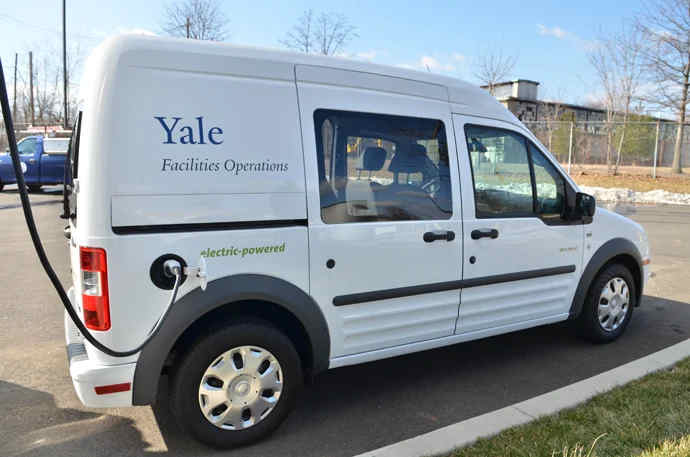
Smaller and more compact than other delivery vehicles, the newest addition to Yale’s fleet is quiet, clean and all electric. The new van, a Ford Transit Connect, produces zero emissions, runs strictly on battery power, and produces minimal noise. It is designed to be well suited for commercial fleets that travel predictable, short-range routes with frequent stop-and-go driving.
“The purchase of this vehicle is in direct support of the University ’s sustainability initiative,” said George Longyear, who directs Fleet Management in addition to running Yale’s graduate housing programs.
His staff will be monitoring the Transit Connect and comparing it with similar gas-powered vans and cars to determine if all-electric vehicles are beneficial to the University over the short and long term. “Since this technology is new, being able to generate comparison-related stats on gas versus electric is just beginning. But we are excited about being able to have the van here on campus and anxious to review the data,” says Longyear.
The Transit Connect will be charged daily via a new, on-campus charging station. The 240-volt charger, donated to Yale by Control Module Industries in Enfield, is now located at the Department of Facilities’ main hub, and is also designed to provide usage information. Additionally, United Illuminating will be installing (at no cost) a smart reader that will monitor kilowatt usage at the charging station. The van is expected to achieve 80 to 100 miles between charges, and have little maintenance costs other than topping off fluids, such as steering or windshield washer, and replacing the battery in 8 to 10 years.
Located at 344 Winchester Ave., the charging station has been integrated with Yale’s security card readers to allow only authorized access by people with University IDs.
“Now staff members do not have to drive off-site to refuel. At the end of the day, they simply plug in and go home. In the morning the van is fully charged and ready to roll. What we don’t know is how it will hold up to the demands of our Facilities operations,” says Longyear. The Ford Transit Connect can handle up to 1,000 pounds of payload — about 600 pounds less than the gas-powered version of the same model.
Sustainable transportation options and downsizing the fleet is a University goal. Associate Vice-President Janet Lindner, who oversees areas including sustainable transportation, transit and fleet management, notes that many operational areas on campus work together to study, pilot, and implement green and cost-saving programs.
“Yale’s sustainable transportation program has been helping to transform how we think about transportation with programs such as public transit benefits, our extensive shuttle system, carpooling, ride sharing, and the ‘Y-Bike’ program,” says Lindner. “The purchase of this electric vehicle is a great addition to this array of options. We look forward to seeing it around campus, and to learning about its long-term performance.”
Yale Fleet Management is eager for performance statistics. Hoping for an apples-to-apples comparison, the University also purchased a gas-powered Ford Transit Connect van. “Over the next year we are guaranteed a fair test environment, with both of these vans in our fleet,” notes Longyear.
Associate Vice President John Bollier, who oversees facilities and campus planning, adds: “We are looking forward to field-testing the new electric service vehicle which has tremendous promise for use around the Yale campus. If these tests prove successful, we envision using many more such vehicles in the future.”



